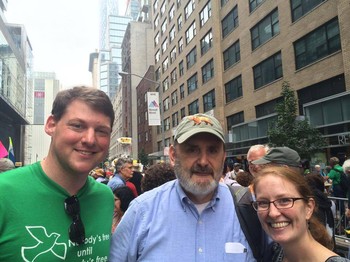Despite the recent terrorist activity in Paris, the world’s pre-eminent climate change conference—the 21st Conference of the Parties (COP 21)—will go on as planned November 30 through December 11 in Le Bourget, France, a northeast suburb of the French capital. The annual meeting brings together all countries and representatives from business, the public sector, the United Nations, non-governmental organizations and the faith community who want to take action for the climate. Presbyterian Church (U.S.A.) associates Rebecca Barnes, associate for Environmental Ministries and Bill Somplatsky-Jarman, coordinator, Mission Responsibility Through Investment (MRTI) with the Compassion, Peace and Justice Program, are attending this year’s conference.
Somplatsky-Jarman has attended every COP conference but one since they began in 1995 in Berlin. He has expectations this year’s COP 21 will be decisive.
“This year’s conference is significant because there are high hopes that we can get a commitment to move forward on reducing gas emissions and replace the Kyoto Protocol signed in 1997,” says Somplatsky-Jarman. “We’ve attempted for several years to update and replace that agreement, and it looks like we’re on the cusp to do it this year in Paris. There’s concern that a new agreement will be robust and strong enough to make a difference, but that’s coupled with lots of optimism and momentum that it can get done.”
Barnes, who oversees the Presbyterian Hunger Program’s Earth Care Congregation initiative, will be attending her first COP conference. She shares hope for global awareness and change, but will also take a local point-of-view to the conference activities.
“Action for climate change needs to happen at every level,” says Barnes. “Not having gone before, it’s exciting to see action, conversation and reflection happening across all levels. I’m looking forward to learning a great deal about how these conversations and negotiations take place between countries, but I’m also looking forward to engaging with our ecumenical global colleagues who are mindful that we can all change our own lives to reduce carbon emissions and consumption. Environmental stewardship is local and international.”

Ryan Smith (L), Bill Somplatsky-Jarman (C) and Rebecca Barnes (R) participated in the People's Climate March in New York City last year. —Photo provided
Even though recent events in Paris make security for participants a valid concern, core negotiations will move forward and there are no plans to postpone the conference, although there is talk of limiting or canceling some of the planned demonstrations and concerts. A recent security update included confirmation from France’s Minister of Foreign Affairs they would “not let terrorism derail what will be one of the most important environmental conferences of our lifetimes.” The exhibits, or conference “side events”, offer representatives like Barnes, Somplatsky-Jarman and others an opportunity to advocate for and learn about sustainable transformation, creative risk management methods for climate change, and low-carbon electricity, among a host of other topics.
“There will be a large presence of investor organizations,” says Somplatsky-Jarman. “I’ll be meeting with government officials and other business leaders to discuss how to harness private equity investment into climate change issues.
For Presbyterians and other individuals interested in monitoring COP 21 developments during the conference, there are several social media outlets to follow. Barnes, Somplatsky-Jarman and Gary Payton, a former director of the Presbyterian Peacemaking Program and mission co-worker, will periodically share their conference reflections and insight on the Eco-Journey blog page. The MRTI and Environmental Ministries Facebook pages will also feature updates as needed. The International Institute for Sustainable Development and the U.S. Climate Action Network are expected to provide daily updates and analysis through their website or newsletter services. On Twitter, follow @Climate_Action_ or hashtags #COP21, #SIF15 and #ClimateAction.
“Climate change is a global issue facing the entire planet so it requires a global response, and the Conference of Parties is the one mechanism we have that allows all the governments of the world to come together and figure out how we move forward,” says Somplatsky-Jarman. “For those of us in the church who are committed to caring about the poor or people who have no voice, this is a platform where all countries can work together on such an important issue. Whether you’re a large developed country or a small island state in the Pacific, we need allies to address vulnerabilities and this is a place to focus on them.”

